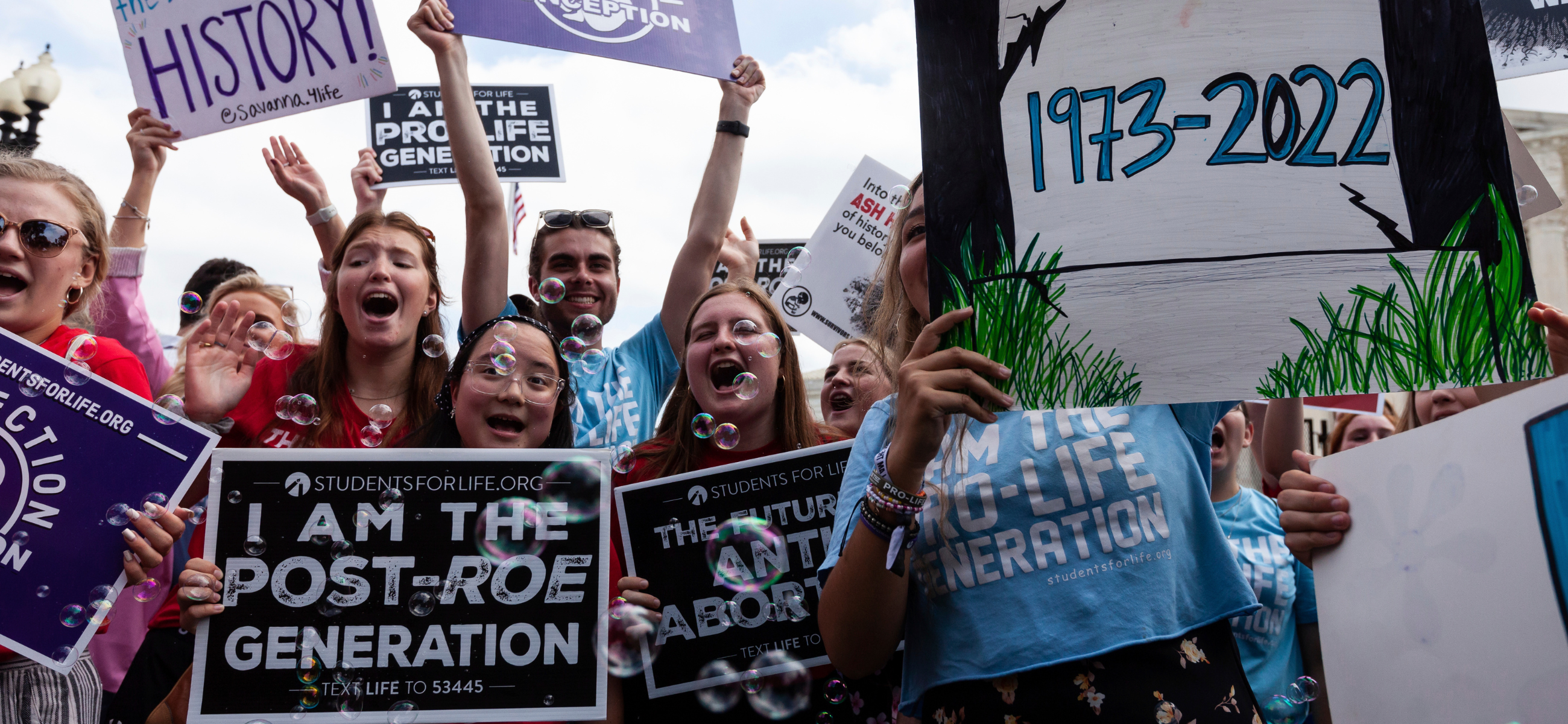Stay ahead of the curve as a political insider with deep policy analysis, daily briefings and policy-shaping tools.
Request a DemoCelebration, challenges mark Georgia’s post-Roe world

Anti-abortion activists celebrate after the Supreme Court issued its opinion on Dobbs v. JWHO. The opinion reverses the federal right to abortion decided in Roe v. Wade, allowing each state to set its own laws. (Credit: Allison Bailey/NurPhoto via AP)
Editor’s note: This is the second story in a series looking at the lack of health care in areas of rural Georgia and how providers and lawmakers are dealing with the issue. Read the first story here.

Abortions in Georgia have fallen by nearly half in the past year, according to the Georgia Department of Public Health. And abortions after six weeks of pregnancy essentially don’t exist, DPH data shows.
That’s good news for people like Cole Muzio, whose organization, Frontline Policy Council, is hosting an event to celebrate the one-year anniversary of the U.S. Supreme Court’s decision that overturned a half-century-old law giving women the constitutional right to an abortion. That decision now belongs to the states.
Overturning Roe v. Wade also cleared the path for Georgia where abortions now are banned once a heartbeat is detected, generally at about six weeks of pregnancy.
“We’re ecstatic,” Muzio, Frontline’s president, told State Affairs. “Based on the studies we’ve seen, about 20,000 lives will be saved in Georgia this year because of the Dobbs decision [which led to the overturn of Roe v. Wade] and the implementation of the Georgia Heartbeat law.”
The number of abortions may be down but that doesn’t tell the full story of what’s happening in post-Roe Georgia, especially in the rural parts of the state.
Abortion restrictions have only exacerbated existing health care challenges for women in rural Georgia.
Nine Georgia counties don’t have a doctor and 18 counties have no family medicine physician. More than half of the state’s counties —82 — don’t have an OB-GYN and 65 don’t have pediatricians.
Dr. Curtrina Strozier, an OB-GYN in Columbus who has been practicing in rural south Georgia for a decade, doesn’t do abortions. But she said that over the last year, she has sent about two dozen patients with unwanted pregnancies out of state because they were more than six weeks pregnant. Many of them couldn’t afford to leave the state, she said.
“In order to even meet certain criteria for medical termination, people have to go through very stringent processes,” Strozier said, adding that abortion clinics in most states need to know how far along a woman is in her pregnancy. So they often require an ultrasound, and some clinics won’t do that until they “see a baby fetal pole [one of the first stages of an embryo’s development], which by the time you see that you may see a heart flicker.”
A 2019 study by University of California-San Francisco researchers concluded that women denied an abortion were more likely than women who received an abortion to experience yearslong economic hardship and insecurity. The study also found laws that restrict access to abortion may result in worsened economic outcomes for women.

One troubling post-Roe development: More women appear to be turning to medications to induce abortions.
While surgical abortions are down, instances of women using medications to induce an abortion is up nearly 20% since Georgia’s abortion law took effect last July, according to the Atlanta Journal Constitution.
“It’s created a huge dilemma,” Strozier said. “People have been exposed to abortion pills yet it doesn’t terminate, and now they’ve had a drug exposure. Now they have a heartbeat of a baby that may have had a lethal or potentially harmful drug exposure early in the pregnancy. Now they’re legally obligated to continue that pregnancy with the drug exposure. We don’t know what the long-term effect is going to be on that baby.”
Through it all, Strozier said she’s encouraged by state lawmakers’ decision to extend postpartum coverage for Medicaid recipients to a year. Nearly half of the births in Georgia — roughly 58,000 — were financed by Medicaid in 2020, according to the Kaiser Family Foundation.
Dr. Keisha Callins, an OB-GYN who practices in Jones and Twiggs counties, said, “We’re one of only a few states that have made that adjustment which is excellent.”
The extension enables postpartum women to get mental health services, “which is important because mental health-related issues are now the No. 1 cause of maternal mortality,” Callins said, citing a Centers for Disease Control and Prevention (CDC) study.
Mental health services are spotty in many rural communities in Georgia and across America. More than 60% of nonmetropolitan counties lack a psychiatrist, and almost half of nonmetropolitan counties do not have a psychologist, compared with 27% and 19% of urban counties, respectively, according to the Bipartisan Policy Center.
Roughly 60% of the patients Callins sees are uninsured. Her focus is working with women before they get pregnant. She talks with them about contraception and provides resources and information where they can get help.

In the last year, a lot of women have found they have more options than abortion, according to Claire Bartlett, executive director of Georgia Life Alliance.
“A lot of women discover pregnancy resource centers, which are wonderful organizations throughout the state,” Bartlett said. “Two main reasons for abortion are financial insecurity and support. Pregnancy resource centers offer both of those. The centers provide prenatal care and have other medical services.”
State lawmakers also passed a law earlier this year that extends some welfare benefits to pregnant women.
Meanwhile, Georgia’s abortion law is being challenged in the Georgia Supreme Court. Last November, a Fulton County Superior Court judge threw out the state law, allowing abortions after six weeks. Shortly after, the state Supreme Court said the law would stand while it’s being challenged. The Supreme Court has not issued a ruling yet.
To date, 13 states — eight of which are in the south — now completely ban abortion, leaving large regions of the country without abortion care and leading to increased wait times at clinics in states where abortion remains legal, according to Guttmacher Institute, a research and policy nonprofit.
Some states also have banned helping a young person travel to other states to get a legal abortion, Guttmacher noted.
“The status of abortion rights in many states is dismal and complex legal questions continue to create chaos and confusion,” the institute notes.
Callins sees it this way: “Abortion here is really the smoke. The fire is access to health care for women. Everybody should have that.”
RESOURCES
- Peace for Moms: Connects Georgia health care professionals with psychiatrists who specialize in perinatal mental health.
- Local health departments: Each of Georgia’s 159 counties has one. Find yours here.
- Georgia has 35 Federally-Qualified Health Centers. Find them here.
Have questions, comments or tips? Contact Tammy Joyner on Twitter @lvjoyner or at [email protected].
Twitter @StateAffairsGA
Facebook @stateaffairsUS
Instagram @stateaffairsGA
LinkedIn @stateaffairs
Related stories:
Related commentary:
Newly minted Senate Minority Leader Harold Jones II: ‘I’m not the typical back-slapping politician’
Nearly 10 years into legislative life, Sen. Harold Jones II wouldn’t change anything about the experience. “I love every minute of it. Even when I hate it, I love it,” the 55-year-old Augusta Democrat told State Affairs. Come January, Jones will add another role to his legislative duties: Senate minority leader, a job held for …
Gov. Kemp calls on state agencies to be fiscally restrained amid record $16.5B surplus
The Gist Gov. Brian Kemp asked the state’s 51 government agencies for continued fiscal restraint when drafting their amended fiscal year 2025 and 2026 budgets. Most agencies adhered to his request even as the state’s general fund surplus hit a record $16.5 billion last month. Forty-five agencies, excluding state courts, followed the governor’s instructions to …
Georgia defies bomb threats as election chief declares a “free, fair and fast” vote amid record turnout
ATLANTA – Despite dealing with over 60 bomb threats, Georgia’s election chief said Tuesday the state’s general election went smoothly. Georgia had a record turnout with nearly 5.3 million people voting, Secretary of State Brad Raffensperger told reporters. Election officials in the state’s 159 counties have until 5 p.m. to certify votes. “We had a …
In the (state)house: Meet the newest members of the Georgia legislature
When lawmakers reconvene at the state Capitol on Jan. 13, there’ll be a cadre of new faces in the 236-member Georgia General Assembly, one of the nation’s largest state legislatures. All 236 statehouse seats were up for election this year. Most candidates ran unopposed. Incumbents in contested races easily kept their seats, with the exception …




